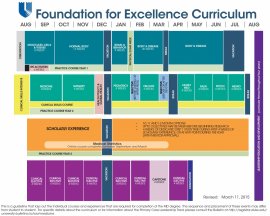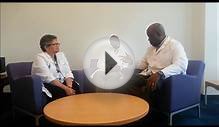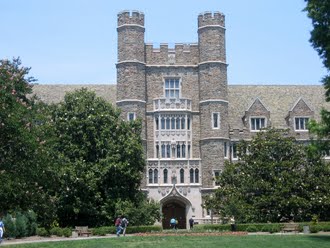

Innovations and Evidence-Based Approaches to Education
We call our education model The Foundation for Excellence Curriculum. It’s the result of more than 40 years of innovative thinking about how to design the very best medical education.
In the 1960s, faculty leaders here at Duke began a bold experiment to increase the opportunities for medical students to tailor their education to serve students’ personal interests and career goals. Our first year curriculum includes four integrated basic science courses that are taught around organ systems, and we have 10-to-12 months of devoted time to investigate scholarly experiences in biomedically related research.
Our students have patient contact early on – they practice history-taking and physical exam skills on patients in the Duke Hospital wards, shadow physicians during the second half of the first year, and begin their clinical clerkships a full year earlier than your colleagues in other medical schools.
Features of the four-year curriculum include:
- development of a core medical curriculum that is rigorous, efficient, integrative, and forms a realistic base of knowledge for a physician;
- integration of basic, clinical, psychosocial, and population information and skills throughout the four years of medical education;
- a “flipped classroom” in the form of Team Based learning;
- general introduction to basic and clinical science for one year each, followed by two years of individualized curricular options that promote professional diversity and personal development;
- an elective third year which permits students to pursue their independent scholarly interest across a range of scientific disciplines from basic biomedical science to health policy;
- promotion of structured active learning that includes explicit experience in leadership and cooperative roles;
- mentorship of students by faculty in all facets of the learning process;
- implementation of a standardized and valid assessment of progress, carefully and thoughtfully evaluating the acquisition of knowledge, skills, and attitudes appropriate to the future goals of each student;
- incorporation of information technology and the use of computers and simulation into student learning and evaluation; and
- research and implementation of new and improved methods of teaching.
Year 1 (Basic Science)
The MS1 year introduces you to the building blocks of medicine-the basic sciences. Duke pares these subjects down to the essentials you'll need in medical practice. Basic science content is integrated into four interdisciplinary courses enabling students to learn the material within the appropriate context. Clinical Correlations tie basic science content to the clinical context through the use of Team Based Learning. In addition, students will take courses in Practice, Interprofessional Education and Leadership.
Year 2 (Clinical Rotations)
During MS2, principles learned in the first year basic science courses will come to life and be continually reinforced as you work with a variety of patients during the clinical clerkships. The second year consists of eight core clerkship rotations, a longitudinal Practice course and Clinical Skills course, a Health Policy/Global Health course, two Selective periods and a summative Clinical Skills assessment.
Year 3 (Scholarly Research)
In the first two years of the program, the overview of basic science, Practice and Clinical Skills courses, clinical rotations and selectives all combine to enable you to make thoughtful decisions about the path you want to pursue during the third and fourth years. Duke's unique third year is a time of opportunity to study an area of particular interest in depth-a time to gain special insight into your long-term career goals and mature your approach to medicine.
During the third year, you will spend 10 – 12 months of scholarly investigation and complete your clinical electives. You may also choose to do a dual degree program as part of a quantitative research thesis.
Year 4 (Clinical Electives)
The clinical elective experience, usually occurring in the fourth year, is used to: (a) aid in decision-making about the area of choice of postgraduate training, (b) obtain experiences in areas that would not be included in that postgraduate training and, above all, (c) pursue active experiences in patient care sufficient to provide the basic skills necessary for doctor-patient interaction. Students are required to complete 28 hours of coursework including a four-week, five credit sub-internship, a four-week critical care elective, and the Capstone course.
See Year 4
Additional Information:
Students are also required to take Step 1 and Step 2 CK and CS exams prior to graduation. (Passing is not required to progress through the curriculum or graduate.) For more information about these exams click here.
RELATED VIDEO




 The Duke University School of Medicine (Duke Med) is Duke University's medical school operating under the auspices of the Duke University Medical Center. Established in 1925 by James B. Duke, Duke Med has earned its reputation as an integral part of one of the...
The Duke University School of Medicine (Duke Med) is Duke University's medical school operating under the auspices of the Duke University Medical Center. Established in 1925 by James B. Duke, Duke Med has earned its reputation as an integral part of one of the...








